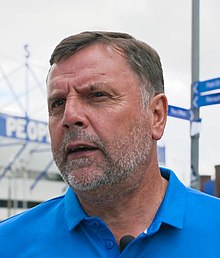Stephen Nicol is a Scottish football player, coach and pundit. Nicol mainly played as a right back and occasionally played in other positions across defence and midfield. He spent most of his playing career with the successful Liverpool teams of the 1980s. He was also a regular member of the Scotland national team and represented his country at the 1986 FIFA World Cup.
Joseph Royle is an English football manager and former footballer. In his playing career as a striker, he debuted for Everton at the age of 16 and went on to play for Manchester City, Bristol City, Norwich City, and the England national team. Later, he managed Oldham Athletic, Everton, Manchester City, and Ipswich Town. He is currently a director at Oldham Athletic.
Gary Michael Stevens is an English physiotherapist and retired footballer who played as a right-back.

Antony Richard Cottee is an English former professional footballer and manager who now works as a television football commentator.

Howard Kendall was an English footballer and manager.
Kevin Ratcliffe is a Welsh former professional footballer who spent most of his career playing for Everton.
Andrew Timothy Ritchie is an English former footballer and manager.

David Robert Speedie is a Scottish former footballer who played for several clubs in England during the 1980s and 1990s, most notably Chelsea, Coventry City, Liverpool and Blackburn Rovers. He accumulated more than 500 football league appearances and scored almost 150 goals in a 14-year professional career. He also earned ten international caps for Scotland.
The 1986–87 season was the 107th season of competitive football in England.
The 1987–88 season was the 108th season of competitive football in England.
The 1990–91 season was the 111th season of competitive football in England. In the Football League First Division, Arsenal emerged victorious as champions.
The 1991–92 season was the 112th season of competitive football in England.
The 1985–86 season was the 106th season of competitive football in England.
The 1984–85 season was the 105th season of competitive football in England.
The 1983–84 season was the 104th season of competitive football in England.
The 1993–94 season was the 114th season of competitive football in England.
Everton Football Club have a long and complex history. The club's roots loosely lie with a Methodist New Connexion congregation who had a chapel on the corner of Breckfield Road North and St. Domingo Vale in Everton, Liverpool. Initially formed as St. Domingo FC, named after the chapel, the football team was renamed Everton in 1879 after the district of Everton. Since then Everton have had a successful history winning the Cup Winners' Cup, the league title nine times and the FA Cup five times. They were the first club to play over 100 seasons in the top flight of English football, the 2022–23 season will be their 119th.
Neil Geoffrey Pointon is an English former professional footballer. Pointon was a left-back who is perhaps best remembered for playing for Everton, Manchester City and Oldham Athletic.
Stuart Barlow is an English football coach and former professional player.
The 1991–92 Liverpool F.C. season was the 100th season in club history and Graeme Souness's first full season as manager of the club. The manager needed heart surgery in April, only to be present when Liverpool won the final of the FA Cup the following month. However, it was a disappointing season in the league for Liverpool, whose sixth-place finish was their first outside the top two since 1981.



